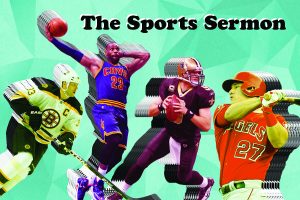What’s in a name? That which we call a team by any other name would play as well…
Sorry, Romeo, but in spite of what Juliet has told you, names are important.
Americans love coming up with fun titles for franchises. Just check out the lower leagues for your favorite sport. Odds are there are more than a few teams with funky, cool, or downright weird names. How we name these teams is not only a reflection of the relationship between the team and its city, but the relationship between America and athletics.
Names can be good for a few different reasons. If a name truly captures the identity of its hometown perfectly, it works, as it does with the Montreal Canadiens. If a name is alliterative and fits with the cadence of the city name, it’s a decent name, like the Washington Wizards. If it can maintain that cadence and makes a loose amount of sense for the region, it’s good, like the Boston Bruins.
But, if you can check all those boxes, you’ve really hit the jackpot, like the New York Yankees. Two syllables per city and team name, alliterative consonants, and a mascot that accents the city’s importance in American history? Gold. Hats off to whoever thought that one up. Even if they weren’t the most successful team in the history of baseball, I’d still be singing their praises.
Sadly, bad names are a whole lot easier to come by than good ones. A few names are bad thanks to relocation, like the Utah Jazz (formerly of New Orleans). Others represent the team’s home, but come out sounding too clunky, like the Portland Trail Blazers. And then, despite whatever reasons a team brings to the table, some team names just suck, like the Atlanta Hawks. The Hawks moved to Georgia in 1968 after changing home cities and names 5 times and 3 times, respectively. There’s no representation or creativity there in the least.
These names, good or bad, also play into the greater scheme of defining American athletic identity. Every culture has its own naming customs and America is no different. Unlike European teams, Americans don’t like to make the city itself the rallying point. We want a mascot, something that represents the city to be the fulcrum of the competition. It’s more cartoony, kitschy even. It is the inclusion of such mascots in names that causes the team to become a part of the city, not for the city to be entirely represented by a team.
The mentality teams foster might be a part of the reason sports games in the U.S. haven’t taken on the cultural significance that competitions in Europe or the Middle East have. Games between Basque soccer teams and teams from the Capital result in fan murders with alarming frequency. Israeli soccer teams Hapoel Tel Aviv and arch-rivals Maccabi had to abandon their derby match this month due to the breakout violence.
Those customs should be respected and applied in other environments sparingly. The results of mixing and matching feel largely forced. Take a look at America’s very own Major League Soccer. The U.S. straight up cut, copy, and pasted some of the most recognizable naming customs from popular European leagues and tried applying them to their own franchises.
The results sounded absolutely contrived. Washington’s own D.C. United is a clear adaptation of the titles of popular British teams. The same can be said of Texas club FC Dallas. By far the worst conversion, however, belongs to none other than Real Salt Lake. The title “Real” was given to Spanish teams who received King Alfonso XIII’s patronage at the beginning of the 20th century. I must have missed the part of the textbook that says Alfonso’s reign extended over Utah. The names of Japan’s first baseball teams didn’t sound any better. The Yomiuri Giants? The Hanshin Tigers? The Tokyo Senators? They’re plain derivative, and a missed opportunity to put their own stamp on a sport, much like the U.S. and soccer.
The next time a business magnate brings an expansion team to your city, and a magazine or newspaper runs a contest letting the public choose the name (the historically preferred method), think very carefully about making a selection. The next time a team moves to a city and wants to keep its old name, take caution in agreeing. These labels might come to define more than ever intended.




